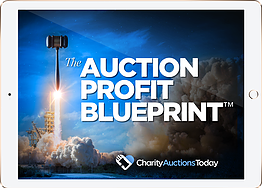DOWNLOAD The Auction Profit Blueprint
The 4 tools BIG organizations use every time to skyrocket auction profits!
The Step-By-Step Guide to stop leaving thousands on the table.
Explore your guide to fundraising event planning. CharityAuctionsToday makes it simple to follow the steps to successful nonprofit event planning.

We all know fundraising events are a cornerstone of nonprofit development strategies. In fact, most nonprofits report that 21% or more of their annual operating revenue comes from events and online fundraising. In-person events, or a combination in-person and virtual events, is one of the most powerful strategies to raise funds for your organization and your mission.
Fundraising events offer a unique blend of benefits that can elevate an organization’s profile and resources significantly.
The primary purpose of a fundraising event is to generate financial resources that support your cause. Whether for a specific project or general operational costs, the funds raised can make a substantial difference in what your organization can achieve.
Fundraising events serve as an excellent opportunity to engage the local community. They can inspire individuals to take action, volunteer, and become invested in your organization’s success.
A well-executed event can draw significant attention to your nonprofit. This visibility is crucial for attracting new donors and reaffirming your presence in the community.
Events allow you to connect with your supporters on a personal level. By cultivating these relationships, you can build a loyal base of donors who are committed to your cause over the long term.
Before diving into the details, it’s critical to establish clear objectives for your fundraising event.
Define Financial Objectives Determine the financial target of your event. This fundraising goal should be ambitious yet achievable and informed by your organization’s funding needs.
Identify Engagement Goals Consider how you want to engage attendees. Set targets for new donor acquisition, volunteer sign-ups, and other forms of participation.
Assess Awareness Targets Decide on the level of awareness you aim to achieve. Whether it’s local, regional, or national exposure, your goals should align with your organization’s strategic plan.
Choose the Right Type of Fundraising Event Selecting an event that resonates with your audience and reflects your mission is crucial.
Match Event Type to Mission Ensure the event type is a natural extension of your organization’s work. This congruence will underscore the importance of your cause to attendees.
Consider Your Resources Take stock of your available resources, including staff, volunteers, and budget. Your choice of event should be realistic given these constraints.
Understand Your Audience Tailor your event to the interests and capacities of your target demographic. An event that appeals directly to your audience will have a greater chance of success.
Once your goals are set and the event type chosen, it’s time to dive into the nitty-gritty of event planning.
Crafting a comprehensive budget is the bedrock of successful event planning.
Itemize all anticipated expenses, from venue rental and catering to marketing and permits. This will form the basis of your financial planning.
Outline all potential revenue streams, including ticket sales, sponsorships, and in-event fundraising activities like auctions or raffles.
Include a contingency fund for unexpected expenses. This safety net is essential for managing risks and ensuring financial stability.

by Joakim Jardenberg, Unsplash
The right time and place are key to maximizing attendance and ensuring a smooth event.
Evaluate potential dates for conflicts with holidays, community events, or similar fundraisers that could impact turnout.
Choose a venue that not only fits your theme and expected guest count but also offers the necessary amenities and accessibility for attendees.
Ensure that all required permits and insurances are obtained well in advance to avoid any legal issues or last-minute scrambling.
A strategic marketing plan is crucial for attracting attendees and generating buzz about your event.
Design eye-catching and informative promotional materials that align with your branding and clearly convey the event details.
Utilize social media, email campaigns, and online advertising to reach a wider audience and keep your event top-of-mind.
Reach out to local newspapers, radio stations, and TV networks to garner press coverage that can amplify your event’s profile.
Sponsorships can greatly enhance your event’s success by providing additional funds and lending credibility.
Research businesses and individuals whose philanthropic interests align with your cause and who might be interested in the visibility that sponsoring your event can offer.
Develop tiered sponsorship packages that offer varying levels of recognition and benefits to appeal to a range of potential sponsors.
Build genuine relationships with sponsors before, during, and after the event to encourage ongoing support.

by Ismael Paramo, Unsplash
Volunteers are the backbone of any nonprofit event, contributing invaluable time and energy.
Assess how many volunteers you’ll need and for what roles, from event setup to guest registration to running activities.
Recruit volunteers through your networks and provide them with the necessary training to ensure they’re effective and comfortable in their roles.
Plan to recognize and thank your volunteers in meaningful ways, as their support is integral to your event’s success.
A well-thought-out program can keep guests entertained and engaged throughout the event.
Create an agenda that balances entertainment, fundraising activities, and informative presentations about your nonprofit’s work.
Whether it’s live music, a guest speaker, or a performance, quality entertainment can significantly enhance your guests’ experience.
Engage attendees with activities that are fun, participatory, and relevant to your cause, such as auctions, games, or demonstrations.
An efficient registration process is essential for a positive guest experience and accurate attendance tracking.
Select an online ticketing system like ours that is user-friendly and offers features like early-bird pricing and group discounts.
Ensure that you have a system in place to manage guest information, communicate event details, and follow up with attendees post-event. Our silent auction system makes it simple to manage guest, bidder, and donor information.
If you’re planning to ask guests to register manually, plan for a smooth on-site registration process with sufficient staffing, materials, and technology to handle guest check-in efficiently. Our QR codes make it easy for you to help guests get up and running on their phones without long lines or help from your staff.
Maximizing fundraising opportunities during your event is a critical component of its success.
Provide a variety of ways for guests to donate, including cash, checks, credit cards, and mobile payment options. Our platform makes it easy for you to supplement your auction proceeds by selling raffle tickets, hosting paddle raise rounds, and accepting donations all on one your event page.
Clearly communicate how donations will be used and the impact they will have, which can encourage guests to give more generously.
Incorporate creative fundraising elements like pledge drives, matching gifts, or thematic giving opportunities that resonate with your cause.
The day of the event is all about execution and ensuring that everything runs smoothly.
Do a final check of the venue, ensuring that everything is set up according to plan and that all equipment is functioning properly.
Ensure that all vendors are on time, briefed on the schedule, and fully prepared to deliver their services.
Place clear signage and decorations that not only guide guests but also enhance the event’s atmosphere and theme.
First impressions are critical, so welcoming guests warmly sets the tone for a positive event experience.
Have a dedicated team of volunteers to greet guests, provide them with any necessary materials, and direct them where to go.
Whenever possible, greet guests by name and share specific details about how their attendance supports the cause.
Ensure that guests are informed about the event’s schedule, layout, and any special activities or fundraising initiatives.

by Daniel Andrade, Unsplash
Keeping donors engaged throughout the event and expressing gratitude for their support is essential.
Regularly update guests on the event’s fundraising progress, which can motivate further donations and create a sense of collective achievement.
Take the time to personally acknowledge and thank major donors, which can encourage them and others to continue their support.
Provide donors with exclusive experiences or access as a way of showing appreciation and deepening their connection to the cause.
Gathering contact information is an opportunity to build your donor database and maintain relationships post-event.
Provide simple and quick ways for guests to leave their contact details, such as sign-up sheets or digital registration kiosks. Or, a link to your CharityAuctionsToday event page. You can export your new donor information at the end of your event.
Be transparent about how you will use their information and provide options for guests to opt out of communications if they prefer.
Develop a strategy for post-event follow-up that keeps attendees informed and engaged with your nonprofit’s work.
Expressing gratitude after the event is just as important as during the event itself.
Personalize Your Thanks Where possible, personalize thank you notes with details that reflect the recipient’s specific contribution or involvement.
Acknowledge All Contributions Send thank you notes to everyone involved in the event, including guests, donors, sponsors, volunteers, and staff.
Use Multiple Channels Leverage a mix of communication channels, such as email, postal mail, and social media, to express your thanks in a way that resonates with each group.
Taking the time to review the event’s performance is critical for learning and improvement.
Collect Feedback Gather feedback from attendees, volunteers, and staff through surveys, conversations, and observation.
Review Financials Compare your actual income and expenses against the budget to assess the event’s financial performance.
Assess Goals Achievement Evaluate whether and how well the event met the goals you set, including fundraising targets, engagement levels, and awareness.
Hosting a successful fundraising event is an art that requires time, dedication, and strategic planning. By following the detailed steps outlined in this guide, your nonprofit organization can host an event that not only raises funds but also fortifies relationships, boosts visibility, and energizes your community around your cause.
Engage wholeheartedly with your guests, donors, and volunteers, demonstrating your appreciation for their support every step of the way. With meticulous planning and heartfelt execution, your fundraising event will contribute significantly to your organization’s mission and the community you serve.
DOWNLOAD The Auction Profit Blueprint
The 4 tools BIG organizations use every time to skyrocket auction profits!
The Step-By-Step Guide to stop leaving thousands on the table.

